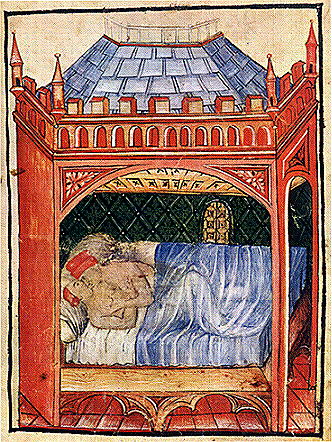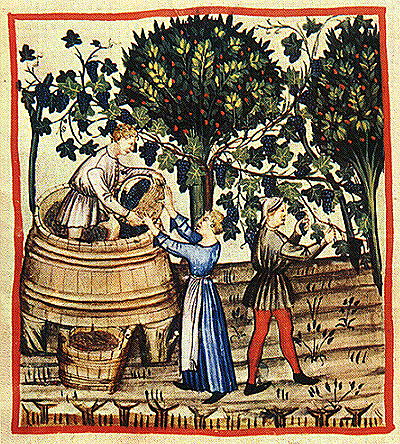 I happened across another fascinating find in my endless sorting of art transparencies at work this week: pages from the Tacuinum Sanitatis. The Tacu-what? you may ask... Well, I had no clue either, but after a couple of days steeped in images of medieval illuminated manuscripts, this one caught my eye (obviously).
I happened across another fascinating find in my endless sorting of art transparencies at work this week: pages from the Tacuinum Sanitatis. The Tacu-what? you may ask... Well, I had no clue either, but after a couple of days steeped in images of medieval illuminated manuscripts, this one caught my eye (obviously).Even better, the caption reads:
Coitus. Nature: It is the union of two for the purpose of introducing the sperm. Optimum: That which lasts until the sperm has been completely emitted. Usefulness: It preserves the species. Dangers: It is harmful to those with cold and dry breathing. Neutralization of the Dangers: With sperm-producing foods.Seriously, slightly risque nature aside, this was just too precious not to share. You can prevent the dangers of sex with sperm-producing foods? Good to know.
Of course, after my discovery I immediately looked up the Tacuinum Sanitatis, which turns out to be a handbook on health and well being. Included among this entry are others on various fruits and vegetables, herbs, flowers, and foods, and information about when they are good, what they are good for, and whom they are good for. Warm water, for instance, apparently has a cold and humid nature and is particularly good for cold temperaments, old people, and in cold regions. Roses are good for inflamed brains, but can cause headaches in certain people.
Even seasons are represented. Here's an appropriate entry:
Autumn. Nature: Moderately cold in the second degree. Optimum: Its central period. Usefulness: when one proceeds gradually toward opposites, as for example, toward warmth and dampness. Dangers: It is harmful to moderate temperatures and to those predisposed toward consumption. Neutralization of the Dangers: By the application of moist elements, and with baths. Effects: Increases melancholy humors. It is suitable to warm and damp temperaments, to the young and adolescent, in warm and damp regions, or in temperate areas.
I don't know much about health and medicine, but as silly as some of these descriptions sound, I wonder how much of it is accurate, or close to it. These statements must be at least partly based in effects that people experienced, even if the causes were attributed wrong.
What is fascinating to me is that even if completely inaccurate and quaint, there is a universality to this way of thinking, as a way to understand our bodies and nature. Don't we still have sorts of guides like this today? That tell us to eat a certain food or the benefits of certain activities. If anything, we've probably taken simple everyday things and broken them down even more and made them more scientific. Makes me wonder if 500 years from now someone will unearth a copy of the South Beach Diet and wonder, what the hell were those people thinking?
Anyone else find this stuff interesting? Any other health advice of today that you think people will look back at and laugh?


I LOVE THIS! (Well, obviously, I'm a medieval history nerd)
ReplyDelete-Rachel
I think I'm already wondering what the hell people were thinking about the South Beach Diet. Doesn't take 500 years, only 5. Interesting post!
ReplyDeleteKatie it's fascinating! LOL Thanks for writing about it. Now I'm going to google Tacuinum Sanitatis.
ReplyDelete